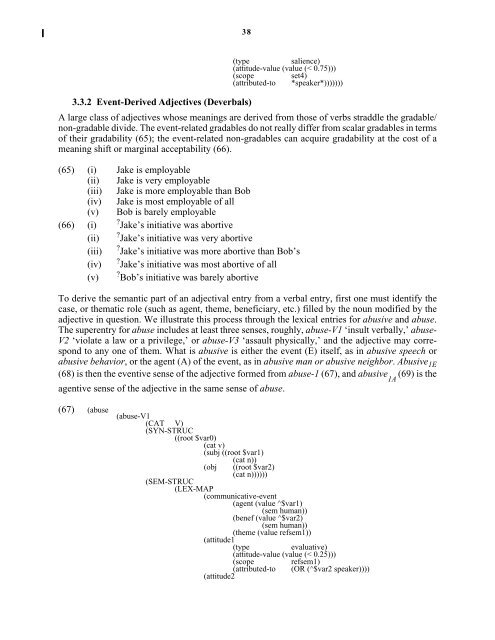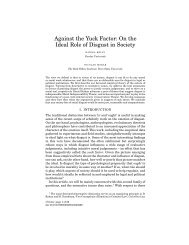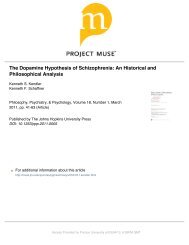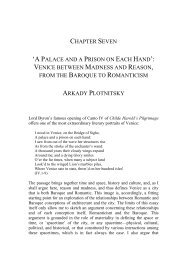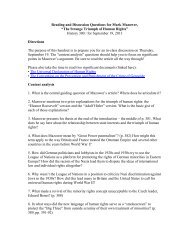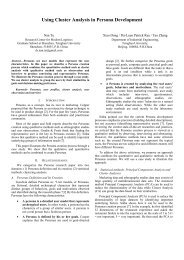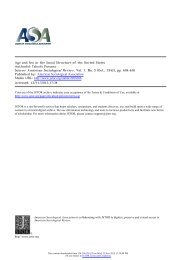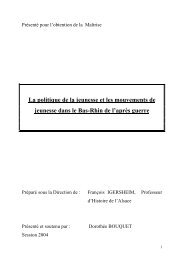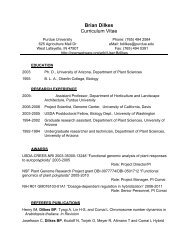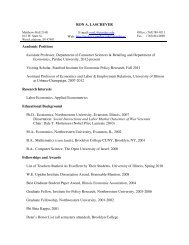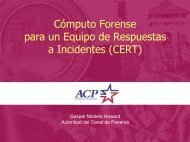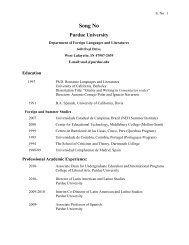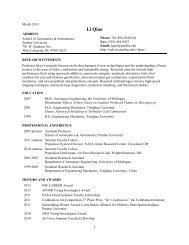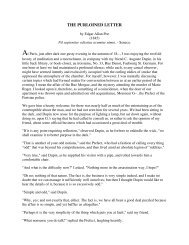Lexical Semantics of Adjectives - CiteSeerX
Lexical Semantics of Adjectives - CiteSeerX
Lexical Semantics of Adjectives - CiteSeerX
You also want an ePaper? Increase the reach of your titles
YUMPU automatically turns print PDFs into web optimized ePapers that Google loves.
38<br />
(type salience)<br />
(attitude-value (value (< 0.75)))<br />
(scope set4)<br />
(attributed-to *speaker*)))))))<br />
3.3.2 Event-Derived <strong>Adjectives</strong> (Deverbals)<br />
A large class <strong>of</strong> adjectives whose meanings are derived from those <strong>of</strong> verbs straddle the gradable/<br />
non-gradable divide. The event-related gradables do not really differ from scalar gradables in terms<br />
<strong>of</strong> their gradability (65); the event-related non-gradables can acquire gradability at the cost <strong>of</strong> a<br />
meaning shift or marginal acceptability (66).<br />
(65) (i) Jake is employable<br />
(ii) Jake is very employable<br />
(iii) Jake is more employable than Bob<br />
(iv) Jake is most employable <strong>of</strong> all<br />
(v) Bob is barely employable<br />
(66) (i) ?<br />
Jake’s initiative was abortive<br />
(ii) ? Jake’s initiative was very abortive<br />
(iii) ? Jake’s initiative was more abortive than Bob’s<br />
(iv)<br />
?<br />
Jake’s initiative was most abortive <strong>of</strong> all<br />
(v)<br />
?<br />
Bob’s initiative was barely abortive<br />
To derive the semantic part <strong>of</strong> an adjectival entry from a verbal entry, first one must identify the<br />
case, or thematic role (such as agent, theme, beneficiary, etc.) filled by the noun modified by the<br />
adjective in question. We illustrate this process through the lexical entries for abusive and abuse.<br />
The superentry for abuse includes at least three senses, roughly, abuse-V1 ‘insult verbally,’ abuse-<br />
V2 ‘violate a law or a privilege,’ or abuse-V3 ‘assault physically,’ and the adjective may correspond<br />
to any one <strong>of</strong> them. What is abusive is either the event (E) itself, as in abusive speech or<br />
abusive behavior, or the agent (A) <strong>of</strong> the event, as in abusive man or abusive neighbor. Abusive1E (68) is then the eventive sense <strong>of</strong> the adjective formed from abuse-1 (67), and abusive (69) is the<br />
1A<br />
agentive sense <strong>of</strong> the adjective in the same sense <strong>of</strong> abuse.<br />
(67) (abuse<br />
(abuse-V1 (CAT V)<br />
(SYN-STRUC<br />
((root $var0)<br />
(cat v)<br />
(subj ((root $var1)<br />
(cat n))<br />
(obj ((root $var2)<br />
(cat n))))))<br />
(SEM-STRUC<br />
(LEX-MAP<br />
(communicative-event<br />
(agent (value ^$var1)<br />
(sem human))<br />
(benef (value ^$var2)<br />
(sem human))<br />
(theme (value refsem1))<br />
(attitude1 (type evaluative)<br />
(attitude-value (value (< 0.25)))<br />
(scope refsem1)<br />
(attributed-to (OR (^$var2 speaker))))<br />
(attitude2


